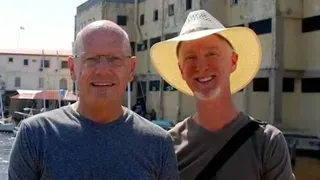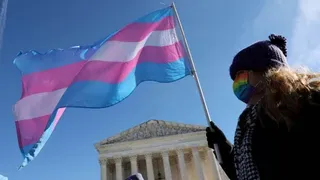December 10, 2011
Does NYC Adequately Fund HIV/AIDS Service Organizations?
Winnie McCroy READ TIME: 6 MIN.
On Dec. 1, Mayor Michael Bloomberg once again invited elected officials and the leaders of HIV/AIDS service organizations to Gracie Mansion for the annual World AIDS Day Breakfast. And he again proposed budget cuts for programs that help people with the virus, including a $1.3 million cut from the Human Resources Administration through delaying housing contracts, and proposed reductions to HIV prevention, screening, and treatment programs.
"Unfortunately, since 2008, all service providers have been hit hard with reductions of five, 25, or 50 percent across city, state, and federal levels," said Latino Commission on AIDS President Guillermo Chacon, who was among those honored at the mayor's World AIDS Day Breakfast. "I always remind people that unfortunately, this trend is not only in New York; it is nationwide."
The tough economic times have certainly affected us all; Bloomberg recently announced that city agencies would cut their budgets by 2 percent. But for those New Yorkers with HIV/AIDS whose lives hang in the balance, these cuts can seem personal.
This was certainly the case for Housing Works President and CEO Charles King and other activists who protested outside Gracie Mansion on Dec. 1.
"The health commissioner used World AIDS Day to announce his plan to strongly encourage people who test positive to go on ARVs (anti-retrovirals,)" said King. "This goes beyond federal guidelines... but more importantly, for homeless people to be fully adherent to treatment, the single biggest support is access to stable housing, nutritional support, case management, and treatment. All those services are denied to anyone whose T-cells are below 200. So on one hand they are saying they want PWAs on ARVs, but on the other hand, they are denying them the resources they need to survive. It starts to look like what the city is talking about is slowing down the disease's progression so they can save money, without providing... the housing and other supports that research has proven are essential."
Police arrested eight protestors that morning for disorderly conduct and obstructing government affairs. (In a somewhat scandalous turn, officers at New York Police Department's Seventh Precinct were later found to have eaten the Mini Munchies pizzas that the activists' supporters had sent them. Housing Works is demanding restitution and an apology, and it may take the matter to Small Claims Court.)
HIV/AIDS Cuts Run Very Deep
Protests notwithstanding, the problem of insufficient funding remains. For Housing Works, only a very small portion of funds come from the city; the lion's share comes from Medicaid reimbursable services and its bookstore, thrift shop and Works Catering companies.
But for Chacon, these cuts went very deep. He said that the Latino Commission on AIDS dealt with them by partnering with others in the advocacy community to focus on prevention.
"I remind people that it is much cheaper to prevent new infections than treat someone with HIV/AIDS," said Chacon, noting that it is six times more expensive to treat HIV than to prevent the virus' spread.
At the World AIDS Day Breakfast, Bloomberg and New York City Health and Hospitals Corporation President Alan D. Aviles accepted an award from the Centers for Disease Control and Prevention in recognition of having tested more than one million New Yorkers for HIV since 2005.
"I remind people that an Affordable Care Act will change how we will deliver services around health care, including HIV/AIDS," said Chacon. "More than ever we need to think in terms of our years to come in health care delivery. In troubled times we must encourage the activist, community-based organizations to promote partnerships in collaboration."
Chacon said that this could be hard to execute because many people feel that they don't need to work with other organizations to deliver services to the community. The Latino Commission on AIDS works closely with the New York Immigration Coalition, the Hispanic Federation, the National Hispanic Medical Association and other groups. Chacon has rallied partners for a Latino AIDS Advocacy week in Albany and city councilmembers for a citywide advocacy day last May.
"I think the old advocacy model of one person making all the decisions doesn't work anymore," said Chacon. "Anyone in an executive position must open it up to all levels for programs that engage people living with HIV/AIDS in a meaningful way."
Doctor Marjorie Hill, chief executive officer of Gay Men's Health Crisis, admitted she has already seen funds go down, while experiencing a 20 percent increase in clients. Many of them come to GMHC with bankruptcy, substance abuse, mental health issues and other issues.
"We cannot afford to have less money, so that means we have to try and raise even more. Instead of submitting three government grants, we have to submit six," said Hill. "Instead of asking 10 major donors, we have to ask 20."
HIV/AIDS Service Organizations Look Towards Private Funders
Although Hill said she is not anticipating major cuts, if the city's Ryan White funding gets less funding, GMHC will get less as well. She has also focused on private fundraising efforts.
"We have a very diverse fundraising strategy that includes individual major donors, corporations and foundations, special events like AIDS Walk, Fashion Forward, this year's 30th anniversary dinner, and grants from the government," said Hill. "That's our portfolio, and we do a full court press on all of those."
Chacon also works to secure funding through alternate channels. "We try to diversify our asks because the truth is that what we do, many other people don't," he said, noting testing on evenings and weekends that targets women, gay black and Latino men and childcare.
While there are fewer resources available across the board, Chacon said there is plenty of money at the top to spread around. "I want to remind the City of New York that in troubled times, we need to spread the impact of the difficulties, and while a lot of people have a lot of resources, they need to ask themselves if they can make a difference in a more meaningful way," he said. "We cannot keep ignoring those at great disadvantage across the board."
One group that keeps a gimlet eye on those at the greatest disadvantage is the New York City AIDS Fund, a collaboration of foundations and corporations working to fight HIV/AIDS. It is working to ensure funding for groups that have the cultural competency to meet the full range of people at risk for HIV-including immigrants and LGBTs-across the five boroughs.
"We are working under the idea that if people are not comfortable with the organization, they are not going to get tested," said Len McNally, chair of the New York City AIDS Fund's Advisory Committee.
The NYC AIDS Fund is primarily funded by the Council of Fashion Designers of America, which has raised more than $15 million over the last 20 years, as well as AIDS United and the Elton John AIDS Foundation, the MAC AIDS Fund, and the Paul Rapoport Foundation. It received 70 proposals last year, and funded more than 20 organizations.
"There is never enough money," conceded McNally. "We made the decision a few years ago that we wanted the grants to be large enough to have good results, so we try not to pare them back so much that they're ineffective... But no matter how much careful deliberation you put in, you are always going to leave some worthy and effective organizations without the money they feel they need to fulfill their mission."
McNally said that although the group does the best it can to reach those affected by the epidemic, it realizes that resources are more limited than the needs.
"The bottom line is, it's a really tough time out there," he said. "We make the best decision we can with the resources we have." The New York City AIDS Trust awarded $1.3 million to 2011 the Asian and Pacific Islander Coalition on HIV/AIDS, Gay Men of African Descent, the Ali Forney Center, Make the Road New York and other groups.
But for those HIV/AIDS service organizations that rely primarily on city funding, a great divide remains between the money they get and the money they need.
"Sometime between now and the beginning of January, we will get the final amount that the city budget allocates to our program," said Chacon. "I am sure it's going to be 25-50 percent less than last year, and that will put a lot of pressure on all of us. It is frustrating, and I hope down the road that will be improved, but it is what it is."
Winnie McCroy is the Women on the EDGE Editor, HIV/Health Editor, and Assistant Entertainment Editor for EDGE Media Network, handling all women's news, HIV health stories and theater reviews throughout the U.S. She has contributed to other publications, including The Village Voice, Gay City News, Chelsea Now and The Advocate, and lives in Brooklyn, New York.






